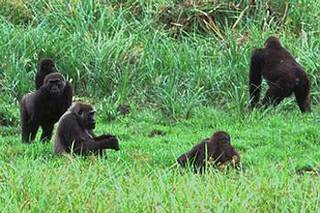 一項由法、美科學家的研究報告指出,在大猩猩身上發現造成人類感染瘧疾的瘧原蟲,以及另外兩個新種的瘧疾寄生蟲。
一項由法、美科學家的研究報告指出,在大猩猩身上發現造成人類感染瘧疾的瘧原蟲,以及另外兩個新種的瘧疾寄生蟲。
加州大學爾灣分校的生物學家阿亞拉(Francisco Ayala)19日發表的共同研究報告證實了最近他與同儕獲得的新發現;即惡性瘧原蟲(Plasmodium falciparum)引起的人類惡性瘧疾,起源於在赤道非洲黑猩猩身上發現的親緣相近的寄生蟲。
惡性瘧疾是一種傳染性疾病,會使病人經歷忽冷忽熱和出汗的周期。它是由被惡性瘧原蟲感染的雌瘧蚊叮咬,進而傳播給人類。
在全球,由惡性瘧原蟲引起的瘧疾是導致死亡和染病主因,特別是對幼童。85%感染人類的惡性瘧疾都是因惡性瘧原蟲而起,而幾乎所有瘧疾死亡的案例也是因感染此寄生蟲。
研究人員警告,多數因伐木和森林破壞,使靈長類和人類之間的接觸機會增加,將導致人類感染新型寄生蟲的風險大增。增加接觸頻率更可能散佈疾病給大猩猩,而進一步危及這瀕危的族群。
研究人員表示,在大猩猩身上發現惡性瘧原蟲,也意味著消滅瘧疾的挑戰將更為複雜。
這項新發現可以幫助發展瘧疾疫苗。瘧疾每年造成200萬嬰兒死亡和約5億人患病,大部分發生在撒哈拉以南非洲。
這項發現還進一步加強了解如愛滋、SARS、禽流感和豬流感等傳染病,如何從動物傳染給人類。
同時,一組澳大利亞研究人員也發表研究,找出了一組可以形成有效瘧疾疫苗基礎的一種蛋白質。
研究團隊之一的比森博士表示,「對瘧疾流行的國家來說,除了造成龐大的衛生負擔,也對社會經濟發展有重大影響。」
The parasite that causes malaria in humans has been found in gorillas, along with two new species of malaria parasites, reports a study by French and American scientists.
Co-authored by University of California, Irvine biologist Francisco Ayala, the study, published Tuesday, confirms a recent discovery by Ayala and colleagues that human malignant malaria, caused by Plasmodium falciparum, originated from a closely related parasite found in chimpanzees in equatorial Africa.
Malignant malaria is an infectious disease that puts the sick person through cycles of chills, fever, and sweating. It is transmitted to humans by the bite of a female anopheles mosquito infected with P. falciparum.
Malaria caused by this parasite is a leading cause of death and disease globally, particularly among young children. P. falciparum is responsible for 85 percent of malignant malaria infections in humans and nearly all deaths from the disease.
The researchers cautioned that increased contact between primates and humans, mostly due to logging and deforestation, creates a greater risk of new parasites being transmitted to humans.
Increased contact also could further jeopardize endangered ape populations by spreading diseases to them.
Finding P. falciparum in gorillas also complicates the challenge of eradicating malaria, the researchers said.
The discovery could aid the development of a vaccine for malaria, which each year causes two million infant deaths and sickens about 500 million people, mostly in sub-Saharan Africa.
The discovery also furthers understanding of how infectious diseases such as HIV, SARS, and avian and swine flu can be transmitted to humans from animals.
Simultaneously, a group of Australian researchers has published a study identifying a group of proteins that could form the basis of an effective vaccine against malaria.
"As well as presenting an enormous health burden, malaria also has a major impact on social and economic development in countries where the disease is endemic," Dr. Beeson said.
全文及圖片詳見:ENS





